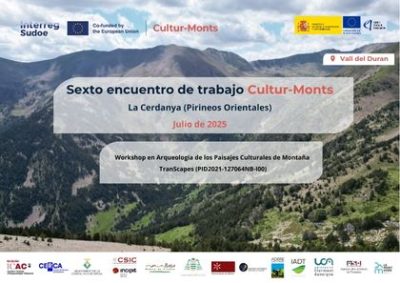
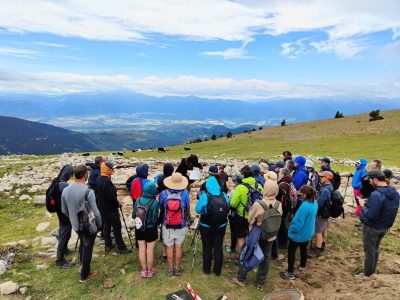
The European project Cultur-Monts will bring together members of its international consortium in La Cerdanya with the aim of discovering its landscape, its heritage and reflect on models of sustainable territorial development, based on culture and respectful tourism.
On July 2 and 3, the municipalities of Llívia, Meranges and Lles de Cerdanya will host the sixth meeting of the Cultur-Monts consortium, becoming the European epicenter of the archaeology of mountain landscapes. This is the second time that the international team of experts in cultural heritage and sustainable territorial development visits the Catalan Pyrenees, as in September 2024 they met in Ripollès.
The Cultur-Monts project aims to enhance the tangible and intangible heritage of the mountain cultural landscapes of southwestern Europe, to become a tool for sustainable territorial development. It is deployed in 5 European work windows over the next 3 years (2024-2026):
-
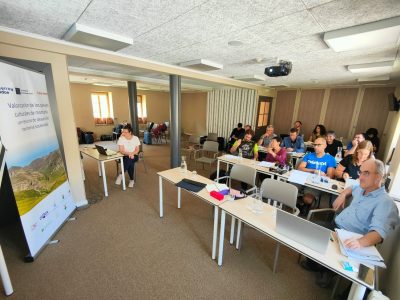
Members of the Cultur-Monts consortium during the third meeting held in Ripollès - Ripollès-Cerdanya (Pyrenees, Catalonia)
- Region of Babia (Cantabrian Mountains, León)
- Region of Camín Real de la Mesa (Cantabrian Mountains, Asturias)
- Sierra de Peneda-Gêres (Northern Region, Portugal)
- Puy-de-Dôme and Lozère (Massif Central, France)
Cultur-Monts was approved in the first call of the Interreg Sudoe 2021-2027 program, and has a total budget of 1,689,340 €, of which 75% is financed by ERDF funds.
The Cultur-Monts international team, formed by members of 10 research institutions, territorial management and municipalities from France, Spain and Portugal, will meet in Cerdanya to continue advancing in the implementation of the project.
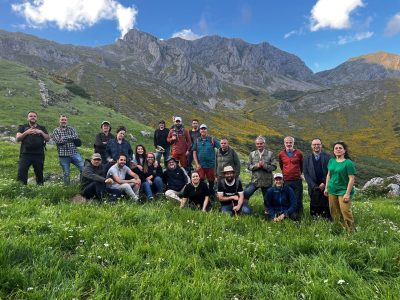
It will devote two days to know the territory in detail: both the cultural landscapes and heritage elements to be highlighted in this work window, as well as the local public, economic and social agents with whom they will collaborate.
The organizer of the meeting is the Institut Català d’Arqueologia Clàssica (ICAC), main beneficiary of the project. The City Council of Meranges and the City Council of Lles de Cerdanya, associated partners of the consortium, collaborate actively. It has the support of the Consell Comarcal de la Cerdanya. The Town Council of Queralbs (Ripollès), the Ethnographic Museum of Ripoll and the Town Council and Municipal Museum of Llívia also participate.
The members of the consortium will visit different emblematic points of Cerdanya’s heritage: the Roman forum of Iulia Libica, the Iberian site of Castellot de Bolvir and the Espai Ceretània, the Duran valley (Estany de Malniu, Prat Fondal and the surroundings of Puigpedrós), the church of Sant Pere de Lles de Cerdanya, the village of Músser and the Rocaviva sculpture park.
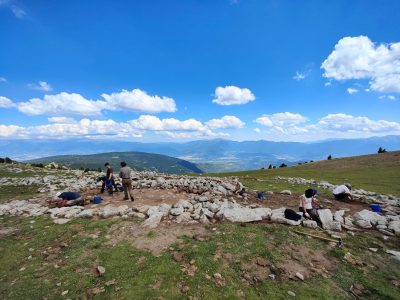
The programme of the sessions aims to focus on the participation of local stakeholders, listening to their needs and expectations, and identifying opportunities for joint work.
The goal is to build a cooperative network between Cultur-Monts and local communities to promote processes of sociocultural innovation, based on knowledge transfer, co-design of actions and resources, and participatory governance.
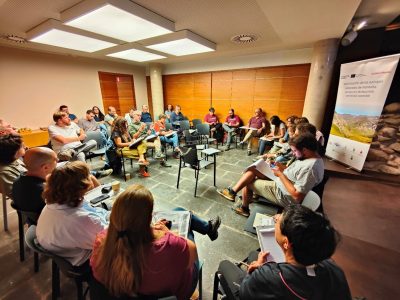
One of the points of the Cultur-Monts sessions in La Cerdanya is the meeting with active livestock farmers (Cal Janet de Travesseres, Formatgeria de Montmelús) and with all those people who preserve the living memory of pastoral and livestock activity in the region. There will also be a presentation of innovative social and cultural initiatives that work to promote local reactivation, such as the Entorns project or the Rocaviva Magic Labyrinth.
The project seeks to preserve and transmit traditional productive activities and popular knowledge at risk of disappearing, which represent valuable intangible heritage linked to mountain cultural landscapes. Their enhancement and revitalisation can be resource to favor the rooting of young people in the territory or the attraction new residents.
Likewise, the aim is to identify practices based on socio-cultural innovation that are inspiring and allow reflection on sustainable development models.
Finally, the project seeks to work with local communities to identify how Cultur-Monts can contribute to existing needs and initiatives in the territory, as weel as to define the best ways to transfer project results and ensure the long-term continuity of the relationships and collaborations established during its implementation.
The meeting will conclude on Thursday, July 3, with a closing dinner at the rural house Cal Rei (Lles de Cerdanya).
View the programme here.





